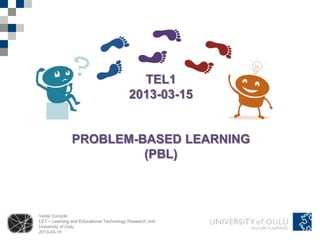
Tel 2013 03-15
- 1. TEL1 2013-03-15 PROBLEM-BASED LEARNING (PBL) Venla Vuorjoki LET – Learning and Educational Technology Research Unit University of Oulu 2013-03-15
- 2. 2013-01-31 2013-02-14 2013-02-28 2013-03-01 2013-03-14 2013-03-15 2013-04-04 2013-04-18 Thursday Thursday Thursday Friday Thursday Friday Thursday Thursday 08:15-14:00 08:15-14:00 08:15-11:30 08:15-15:45 08:15-14:00 08:15-15:45 08:15-11:30 08:15-11:30 KTK205 + KTK303 + KTK303 + KTK215 KTK112 KTK303 KTK215 HU108 KTK112 KTK140 KTK140 Course info, Lectures and Lectures and Problem-Based Lectures and Problem-Based Lectures and Collaborative lectures and collaborative collaborative Learning (PBL) collaborative Learning (PBL) collaborative studying and collaborative studying studying studying studying ending the course studying OUTCOME: GATHERING PEDAGOGICAL TECHNOLOGICAL CONSTRUCTING A TEL COURSE IDEAS SCRIPTING SCRIPTING THE COURSE DESIGNED BY ENVIRONMENT YOU Venla Vuorjoki LET – Learning and Educational Technology Research Unit University of Oulu 2013-03-15
- 3. Today’s schedule: Friday 2013-03-15 08:15-10:00 About assessment and timetables KTK303 STEPS 1-5 (Collaborative studying) (10:00-15:45) Independent study phase (STEP 6) STEP 7 and presenting the results on our next face-to- face meeting (April 4th) Venla Vuorjoki LET – Learning and Educational Technology Research Unit University of Oulu 2013-03-15
- 4. Timetable for the assignments • Both Pedagogical script and technological script should be finalized and sent (as a pdf) to Venla before Tuesday 2nd of April. • If you need help, advise or feedback about the technological decisions, please contact Jari. While writing your technological script, you should read: • Siemens & Tittenberg (2009). Handbook of Emerging Technologies for Learning. http://elearnspace.org/Articles/HETL.pdf • Other materials that are relevant for your technological design Venla Vuorjoki LET – Learning and Educational Technology Research Unit University of Oulu 2013-03-15
- 5. Assessment of collaboration and individual grades? Pedagogical decisions and script for your course 0-5 based on the criteria presented earlier Technological decisions and script for your course, course environment 0-5 based on the criteria that Jari will present this afternoon The average (0-5) is the grade that your team gets from the products. • Should we evaluate the collaborative process within the teams? How? • How will we define the individual grades (0-5) based on the team grade? Venla Vuorjoki LET – Learning and Educational Technology Research Unit University of Oulu 2013-03-15
- 6. Teaming up 4 teams 4-6 students in one team Venla Vuorjoki LET – Learning and Educational Technology Research Unit University of Oulu 2013-03-15
- 7. Roles within your team Decide, who will be the ”leader” that will make sure that your work is proceeding according to the instructions and timing… Decide, who will be the one, who writes things down… Remember that all the team members should be equally active and committed to the teamwork! Venla Vuorjoki LET – Learning and Educational Technology Research Unit University of Oulu 2013-03-15
- 8. Step 1: clarifying and agreeing on terms and concepts that are unclear • Read the technological script instruction and discuss with your team that have you all understood it similarly You have 15 minutes for this step Venla Vuorjoki LET – Learning and Educational Technology Research Unit University of Oulu 2013-03-15
- 9. Step 2: defining the problem • Choose one (the most interesting or challenging) thing from the script instruction define a working title or core problem you will base your teamwork on You have 15 minutes for this step Venla Vuorjoki LET – Learning and Educational Technology Research Unit University of Oulu 2013-03-15
- 10. Step 3: brainstorming • Write down things, concepts and words that come to your mind when you think about your working title / theme (one for each note) You have 15 minutes for this step Venla Vuorjoki LET – Learning and Educational Technology Research Unit University of Oulu 2013-03-15
- 11. Step 4: discussing, evaluating and organizing possible explanations into potential hypothesis • Create a mind map (or some kind of ”picture”) of the theme by organizing your notes • Discuss about the relations of the concepts and causalities between things • Try to see, what you allready know and realize, what kind of knowledge is missing… You have 25 minutes for this step Venla Vuorjoki LET – Learning and Educational Technology Research Unit University of Oulu 2013-03-15
- 12. Step 5: generate and prioritize learning objectives, divide research workload • When you now know, what you know and what you don’t now, it’s time to set a goal for your learning: Write down a question you want answer to or learning goal you want to achieve You have 15 minutes for this step Venla Vuorjoki LET – Learning and Educational Technology Research Unit University of Oulu 2013-03-15
- 13. Step 6: private study time to research objectives Search for answers to your questions individually • To find information you can use: – Traditional and electronig books and journals from the library (utilize the library access and library staff) – Articles you have previously read for your studies, slideshows or notes from previous lectures – Different internet sources: google, wikipedia, google scholar, slideshare etc. – Any expert anywhere that you can get in contact with • You should organize or write down the information in a way that you can quite clearly present your findings to your team • You will discuss about what you have found and learned in the next meeting (April 4th) and will then create 20 minutes presentation based on your team’s shared understanding (with references) Venla Vuorjoki LET – Learning and Educational Technology Research Unit University of Oulu 2013-03-15
